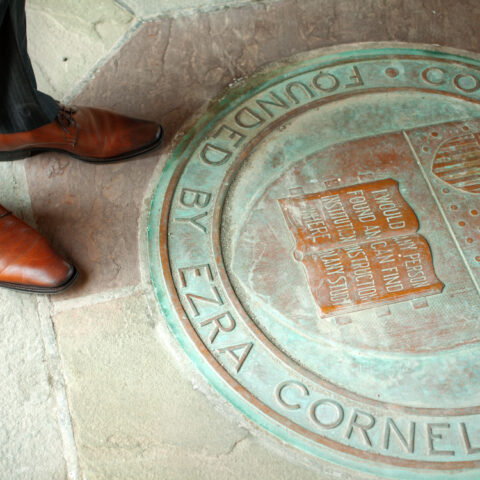Cornell University respects and is committed to fundamental principles of academic freedom and rights of freedom of speech and expression as set forth in the following Statement and in other Cornell policies. Freedoms to engage in research and scholarship, to teach and to learn, to express oneself and to be heard, and to assemble and to protest peacefully and lawfully, are essential to the function of the University as an educational institution.
The University’s Statement of Core Values affirms the fundamental nature of Free and Open Inquiry and Expression:
We are a community whose very purpose is the pursuit of knowledge. We value free and open inquiry and expression—tenets that underlie academic freedom—even of ideas some may consider wrong or offensive. Inherent in this commitment is the corollary freedom to engage in reasoned opposition to messages to which one objects.
The University affirms the importance of extending to all students and employees the core values of free and open inquiry and expression and recognizes employees’ right to communicate freely outside of the scope of their Cornell employment in their capacity as private citizens. As stated in the American Association of University Professors (AAUP) 1940 Statement of Principles of Academic Freedom and Tenure, “Institutions of higher education are conducted for the common good and not to further the interest of either the individual teacher or the institution as a whole. The common good depends upon the free search for truth and its free exposition.”
The University endorses the Faculty Statement on Academic Freedom and Responsibility adopted by the University Faculty on May 11, 1960, which provides:
Academic Freedom for the Faculty means: Freedom of expression in the classroom on matters relevant to the subject and the purpose of the course and of choice of methods in classroom teaching; from direction and restraint in scholarship, research, and creative expression and in the discussion and publication of the results thereof; to speak and write as a citizen without institutional censorship or discipline. . .
Academic freedom is valued very highly at Cornell, and the University Faculty defends it tenaciously; nevertheless, the same University Faculty is disinclined to see the concept abused. Academic freedom does not imply immunity from prosecution for illegal acts of wrongdoing, nor does it provide license for faculty members to do whatever they choose.
The University recognizes that academic freedom also encompasses the freedom to address any matter of institutional policy or action whether or not as a member of any institutional governance body. The University further affirms that “a faculty member’s expression of opinion as a citizen cannot constitute grounds for dismissal unless it clearly demonstrates the faculty member’s unfitness to serve. Extramural utterances rarely bear upon the faculty member’s fitness for continuing service. Moreover, a final decision should take into account the faculty member’s entire record as a teacher and scholar.” See AAUP 1940 Statement of Principles of Academic Freedom and Tenure, with 1970 Interpretive Comments, note 6.
Responsibilities
The Cornell community, including the University Assembly and other elected governance bodies, have a responsibility for protecting freedom of speech and academic freedom. Towards that end, the President or the President’s designee shall consult with the University Assembly, Faculty Senate, Student Assembly, Graduate and Professional Student Assembly, Employee Assembly, and other elected campus governance bodies on a regular basis to ensure that the community’s fundamental commitments to free expression, academic freedom, and respect for others are safeguarded.
Responsible enjoyment and exercise of these rights includes respect for the rights of all. Infringement upon the rights of others, including the rights to speak and to be heard, or interference with the peaceful and lawful use and enjoyment of University premises, facilities, and programs, violate this principle. Though the necessity is rare, the University has long affirmed the President’s authority and duty to protect the community and maintain public order where imminent threats to health and safety require it. However, any intervention by the President or the President’s designee in campus rights of expression and assembly shall be reported promptly to the Cornell community, including the elected campus governance bodies, with an explanation of the bases for the actions taken and the plan for restoring, as expeditiously as possible, any rights of expression and assembly that may have been restricted. See Policy 6.4, Prohibited Bias, Discrimination, Harassment, and Sexual and Related Misconduct and Procedures.
The University is committed to protecting academic freedom and to creating a learning, living, and working environment free of discrimination, harassment, and sexual and related misconduct. Based on the protections afforded by academic freedom, speech and other expression in the context of instruction or research will not be considered prohibited conduct unless this speech or expression meets the definition of discrimination or protected-status harassment under Cornell policies and procedures, and also meets one or both of the following criteria: a reasonable person in the setting would find it to be abusive or humiliating toward a specific individual or specific individuals, or it persists despite the reasonable objection of the specific individual or individuals targeted by the speech.







